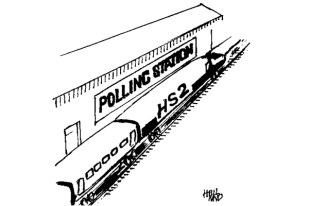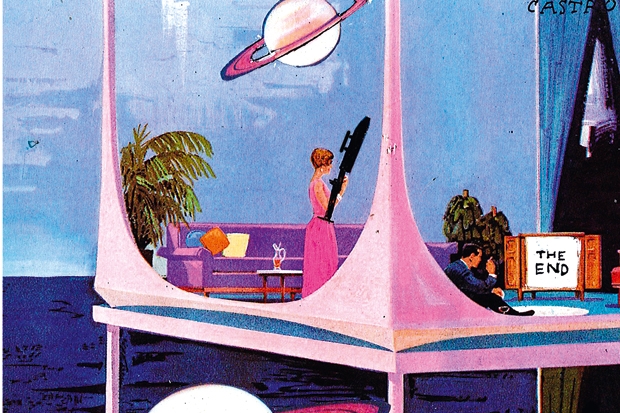New York City

An architect friend who usually designs Manhattan skyscrapers was recently asked to pitch for a far more interesting project. The client, a senior partner at Goldman Sachs, wanted him to design a family house in upstate New York with a difference. It wouldn’t just be completely ‘off the grid’, with its own power and water supplies, but — and there isn’t yet an architectural term for this — it would be post-apocalypse. The conventional house would be mirrored below ground with pretty much identical living quarters that would be completely secure and so self-contained that there would be facilities to hydroponically grow plants and vegetables without soil. ‘Americans shouldn’t believe they’re immune to social unrest’ was all the prospective client would offer by way of explanation. He primarily wanted the house as a refuge for his own family but also, he revealed magnanimously, saw it as a possible rallying point for humanity in the event of some future catastrophe. The strange thing was that when my friend rang a mechanical engineer for advice on a few technical details, rather than be gobsmacked, the engineer said he’d been working on pretty much the same brief for another Wall Street titan. Only he wanted a moat, too. ‘What do they know that we don’t?’ the architect asked me. You could pose the same question of the rich libertarian Americans quietly buying up land on the central Pacific coast near Santiago. Galt’s Gulch, Freedom Orchard and Sovereign Valley Farm are all names of putative Chilean enclaves for like-minded conservatives and their loved ones. Here they will live when the US economy collapses under the weight of big-spending liberals like Barack Obama and America is plunged into complete social meltdown and/or a police state. Chile’s attractions include low taxes, privatised social security, a pleasant climate and a decent international airport. Readers of Ayn Rand’s laissez-faire epic Atlas Shrugged will recognise the reference to Galt’s Gulch, the refuge for a bunch of business leaders who have fled a restrictive government. And they’re hardly alone in their fears. Ron Paul, the former US congressman who has twice run for president on a libertarian ticket, warned a conference in Washington last year that ‘there’s going to be a whole lot more chaos yet to come. It will be a worldwide phenomenon: the States won’t escape it either.’ A recent survey found 22 per cent of Americans believe that the world will end during their lifetime. While the supposed end of the ancient Mayan calendar on 21 December 2012 failed to bring the global apocalypse some had expected, there are plenty more popular doomsday scenarios to choose from. The power grid could be destroyed by a huge solar flare or the electromagnetic pulse from a nuclear explosion. Other popular possibilities include a huge earthquake, asteroids, serious social unrest, the Second Coming of Christ and a zombie invasion. So-called doomsday preppers intend to be ready when it comes, whatever ‘it’ is. There are estimated to be three million committed preppers in the US, and — as our fearful friend in the Goldman Sachs corner office proves — they are certainly not all the Bible-thumping rednecks you might expect. However, they do tend to be conservative, sharing a deep mistrust of their government and scepticism about where America is heading. There have been doomsday cults in the US since the off, and survivalist militias in combat gear were charging around the woods preparing to fight government baddies during the Clinton presidency. But that’s nothing on the cynical mood now. The chief reason has been Barack Obama winning a second term — many preppers believe he will start trying to separate citizens from their guns, sparking civil war. For the very rich, there is the added paranoia caused by the growing wealth gap and widespread predictions that it could lead eventually to serious social unrest. Drive along the East River into Manhattan’s financial district and you can’t miss a huge billboard advertising a storage warehouse. ‘The French aristocracy never saw it coming either,’ it reads. Endearingly cryptic … unless you’re a twitchy banker and then the threat is fairly obvious. A well-known Wall Street financial adviser, David John Marotta, recently told investors they should prepare for a financial apocalypse by carrying around an emergency ‘bug-out bag’ containing food, a gun and ammunition. According to James Stevens, alias Doctor Prepper, who is the guru of a movement he prefers to call ‘family preparedness’, most preppers are white, middle-class and affluent. Black people aren’t interested, he says. Read prepper online forums and you’ll pick up on a definite elitism, a view that they’re the chosen few and that some people’s lives are too frivolous to be worth saving. One has to ask how many of these people are simply fantasising about an alternative world in which they are the hero. Being that hero doesn’t come cheap. America’s ‘disaster preparedness’ economy is estimated to be worth some annual $500 million in sales to ordinary punters — several billion dollars when you include sales to businesses and the government. That’s just the stuff you fit in a backpack. If you have $2 million to spare, you can have your own decommissioned nuclear missile bunker as an end-of-the-world getaway. When a developer converted a 1960s-era missile silo in Kansas into a 174ft deep apartment complex, some sniggered but he quickly sold all 14 of the 1,820 sq ft units. There’s a long waiting list for further silo conversions that he plans. Survival Condo will have enough supplies of site-grown food, and purified well and rain water, to accommodate 70 people indefinitely, says the developer. The flats boast large HDTV panels simulating windows (giving views of a world that no longer exists). The silo also boasts a cinema, spa, classrooms, bar and pool. Zombies and other non-members will be kept out with ground-level security cameras, electric fences and the lethal contents of an onsite armoury. For those who need to prepare on a tighter budget for D-day (preppers call it TSHTF, or ‘the shit hits the fan’), there are cheaper options such as a 40 ft long, 10 ft diameter corrugated steel tube that can house six and be buried in your back garden. It’s a snip at $72,000, although the fake tree or rock to conceal the air vent is extra. Early buyers were offered a free ten acres at a secret prepper settlement in Arizona so they could bury their tube near like-minded neighbours. Hardened preppers are spending hundreds of thousands of dollars on their obsession, egged on by their own radio network and two reality TV series about their eccentric lives. Specialist prepper property companies such as Survival Realty are continually looking for appropriate homes, listing properties with amenities such as ‘invisible from road’, ‘reinforced concrete turret with open view all around’ and ‘defensible hillside location’. If living conditions can sound a little spartan, just try the food you’ll be living on. A job lot of 11,880 servings of freeze-dried food, including ‘hearty’ potato, scrambled eggs with bacon, and cheddar broccoli rice, will set you back $3,299.99. You can ring the changes with delights such as the Candwich, a sandwich in a can, which is good for seven to ten years. Shelf Reliance, a preserved food company, will keep delivering supplies as long as there’s still a Post Office. The company has seen its income soar by more than 700 per cent since Obama was elected. What about the kids? They’ll want their own children’s tactical vests that cost $499 and — of course, in a world where nobody will be enforcing the law — their own guns. Pre-teen visitors to prepper conventions like Self Reliance Expo or Prepper Fest can practise on a range while there’s a survivalist group down in Florida that teaches members as young as nine how to use an AK-47 assault rifle. The North Florida Survival Group offers to teach families how to live off the land, purify water and handle automatic combat weapons. Guns & Ammo magazine’s ‘eight must-have prepper guns’ include a high-powered deer rifle, a small automatic for night-time trips outdoors to relieve yourself and a TAC-50 sniper rifle to ‘protect your perimeter’ which is also ‘mobile enough for transport in case you need to switch caves’. Preppers won’t just need to fight off marauders, they eventually have to start repopulating the planet. This could be tricky. Most of them are men and it takes a certain type of female to want to discuss digging a slit trench or creating manure from human waste. There are at least three ‘Doomsday dating’ sites, including PrepperDating, which promises, ‘You no longer have to feel like you’re wearing a tinfoil hat when talking to someone about your need to be prepared.’ Another, Survivalist Singles (motto: ‘Don’t Face The Future Alone’), has nearly 7,000 members, more than two thirds of them men. ‘A woman wearing a backpack in her profile picture is an automatic ten,’ comments one member. Another, calling himself ‘BritByBirthUSByHeart’, admits he’s ‘not much for this kinda thing, usually too busy workin’ on the compound’. He provides a picture of himself lying down crouched over a sniper’s rifle. How could any girl say no? I know of only one prepper in my Brooklyn neighbourhood and I worry how much his heart is really in it. His wife, who’s from Yorkshire, ribs him mercilessly for the canned food and other emergency supplies he is stockpiling in their cellar. Perhaps he will have the last laugh when a meteor strike devastates the western hemisphere and exposes our hopeless lack of self-reliance. Even so, there’s something I would like to ask him first: assuming he really does want to survive in a post-apocalypse world, has he seen who he’s going to be sharing it with?






Comments